Values In Action (VIA) @ Peicai
Objectives
Our Values-In-Action (VIA) Programme aims to cultivate leadership qualities in our students by fostering personal mastery and socio-emotional competencies. We strive to empower students to make meaningful contributions to society, becoming responsible and compassionate individuals who lead by serving others.
Through this approach, we encourage the following in our Peicaians:
-
Personal Growth: Students cultivate self-awareness, resilience, and discipline, which are key traits of personal mastery.
-
Socio-Emotional Learning (SEL): Students build empathy, relationship management, responsible decision-making, and teamwork, which are crucial for fostering a community-oriented mindset.
-
Community Engagement: By participating in community projects, students learn to lead by example and contribute to causes that benefit others, reinforcing the values of responsibility, service, and empathy.
The Leadership Through and For the Community programme is designed to nurture future-ready leaders who exemplify strong values and a commitment to personal growth. Through various experiential learning opportunities, students develop key leadership skills, such as resilience, empathy, and collaboration, while engaging in projects that make a positive impact on the community.
By encouraging students to demonstrate these values in real-world settings, we aim to cultivate a sense of responsibility and social awareness, shaping them into leaders who not only excel in their personal lives but also inspire and uplift others around them.
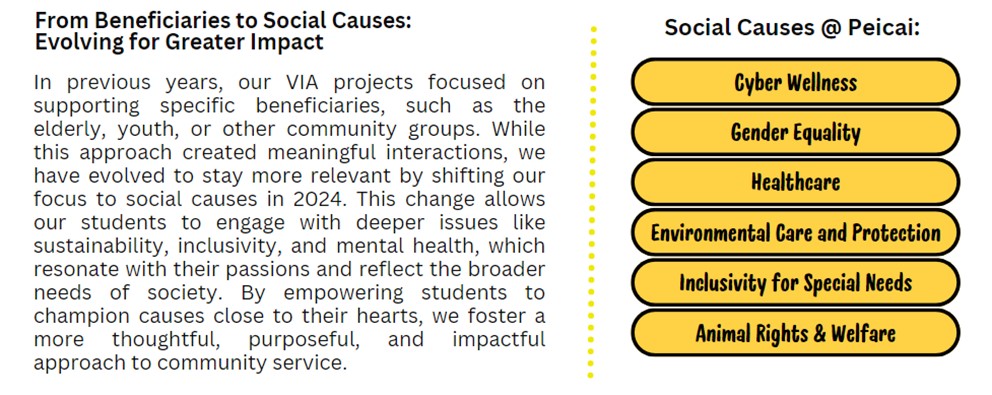
Learn, Act, Pass-It-On @ Peicai
At Peicai Secondary School, our Values in Action (VIA) programme is based on the "Learn, Act, Pass-It-On" framework, aligned with social cause-based VIA. Our VIA programme provides students with meaningful opportunities to develop empathy, social awareness, and active citizenship. Through progressive, hands-on experiences from Secondary 1 to 3, students learn to understand, act on, and advocate for social causes that matter to them. Each level builds upon the previous, guiding students from awareness and understanding, to action and advocacy.

|
|---|
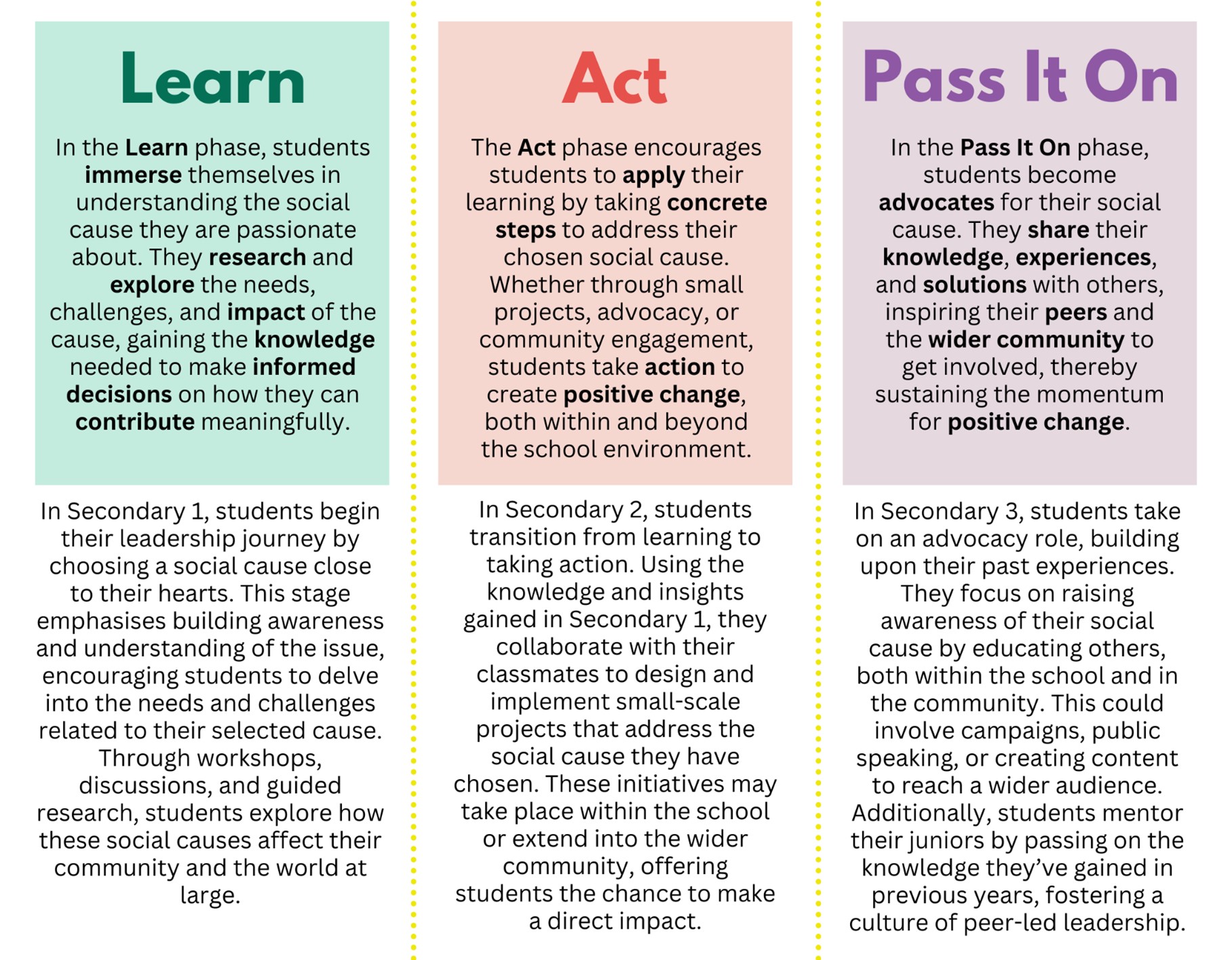
|
Key Programmes:
Secondary 1: Learning About Social Causes
In Secondary 1, students begin their leadership journey by choosing a social cause close to their hearts. This stage emphasizes building awareness and understanding of the issue, encouraging students to explore the needs and challenges related to their selected cause. Through workshops, discussions, and guided research, students learn how these causes impact their community and the wider world.
Key Objectives for Secondary 1:
-
Build awareness of social causes through research and discussions.
-
Develop a personal connection to a cause and reflect on its importance.
-
Foster socio-emotional competencies like empathy and self-awareness.
The focus at this stage is on developing empathy and a foundation of understanding. Students also reflect on how their personal values align with their chosen causes, preparing them for deeper engagement in subsequent years.
Secondary 1 VIA Activities – 2025
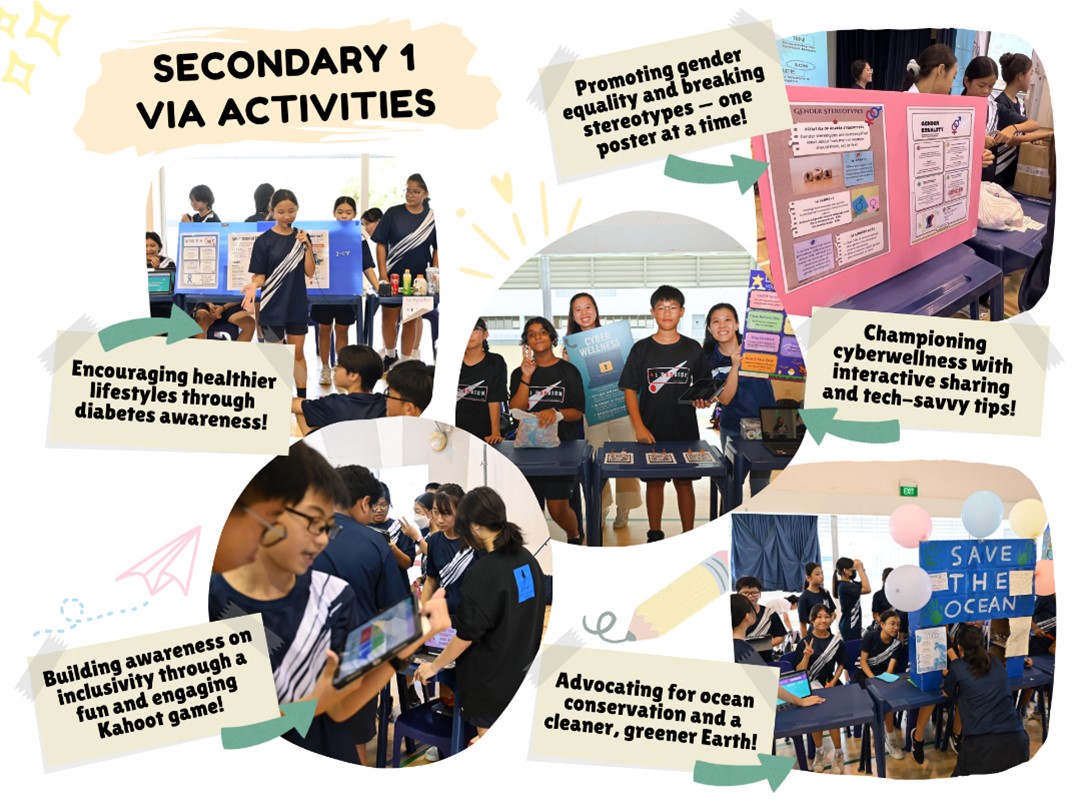
|
|---|
|
In 2025, our Secondary 1 students were the second cohort to carry out their VIA projects on social causes. Building upon the experiences of their seniors, many had the opportunity to learn directly from Secondary 2 students who shared the same social causes. As part of a cross-level sharing initiative, each Secondary 1 class was paired with a Secondary 2 class focusing on a similar cause. The Secondary 2 students designed and facilitated interactive games and discussions to help their juniors better understand the issues at hand. This meaningful exchange allowed Secondary 1 students to gain greater awareness and insight into their causes, while also inspiring them to think about how they might take action in the future. The experience culminated in a level-wide sharing event, where Secondary 1 students hosted booth exhibitions to raise awareness among their peers and apply what they had learned. |
Secondary 2: Acting on Social Causes
In Secondary 2, students transition from learning to taking action. Using the knowledge and insights gained in Secondary 1, they collaborate with their classmates to design and implement small-scale projects that address their chosen social causes. These initiatives may take place within the school or extend into the wider community, allowing students to make a tangible impact.
Key Objectives for Secondary 2:
-
Take meaningful action through projects that address social causes.
-
Collaborate with peers to create impact, either in school or the community.
-
Strengthen leadership, teamwork, and problem-solving skills in real-world settings.
The focus here is on applying learning through action and using creativity to bring about positive change.
Secondary 2 VIA Activities – 2025
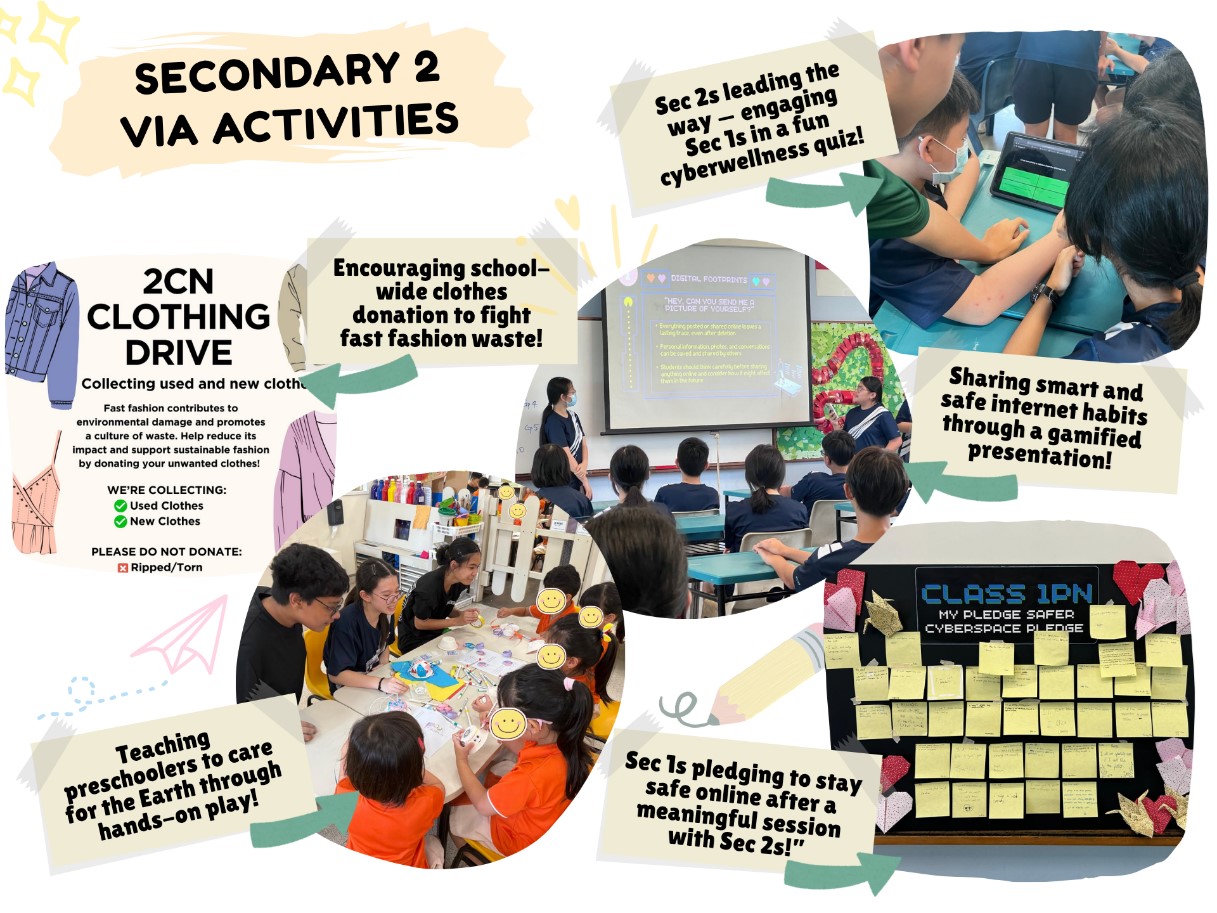
|
|---|
|
In 2025, our Secondary 2 students took meaningful steps to translate understanding into action through a variety of impactful projects. Within Peicai, one class organised a clothing donation drive, collecting pre-loved clothes from students and staff to promote sustainability and support those in need. Two other classes stepped beyond the school grounds to create impact in the wider community — one visited St Luke’s ElderCare, where students spent the day connecting with seniors, including those with dementia, to promote inclusivity and compassion. Another class partnered with a preschool, designing and conducting engaging, age-appropriate activities to teach young children about environmental sustainability. Meanwhile, through the cross-level sharing sessions with Secondary 1 students, the Secondary 2s furthered their objective of creating impact within the school community. By preparing interactive activities and games, they deepened their juniors’ understanding of important social causes while strengthening their own sense of purpose and leadership. |
Secondary 3: Passing It On and Advocacy
In Secondary 3, students take on an advocacy role, building upon their past experiences. They focus on raising awareness of their social causes by educating others — within the school or in the community. This may involve campaigns, partnerships, or outreach initiatives with external organisations. Students also mentor their juniors, passing on their knowledge and fostering a culture of peer-led leadership.
Key Objectives for Secondary 3:
-
Advocate for social causes by raising awareness through campaigns and projects.
-
Mentor younger students, passing on knowledge and encouraging participation.
-
Enhance communication and advocacy skills, while fostering a sense of responsibility for community improvement.
At this stage, students become ambassadors for their causes, using their voices and actions to inspire others to make a difference.
Secondary 3 VIA Activities – 2025
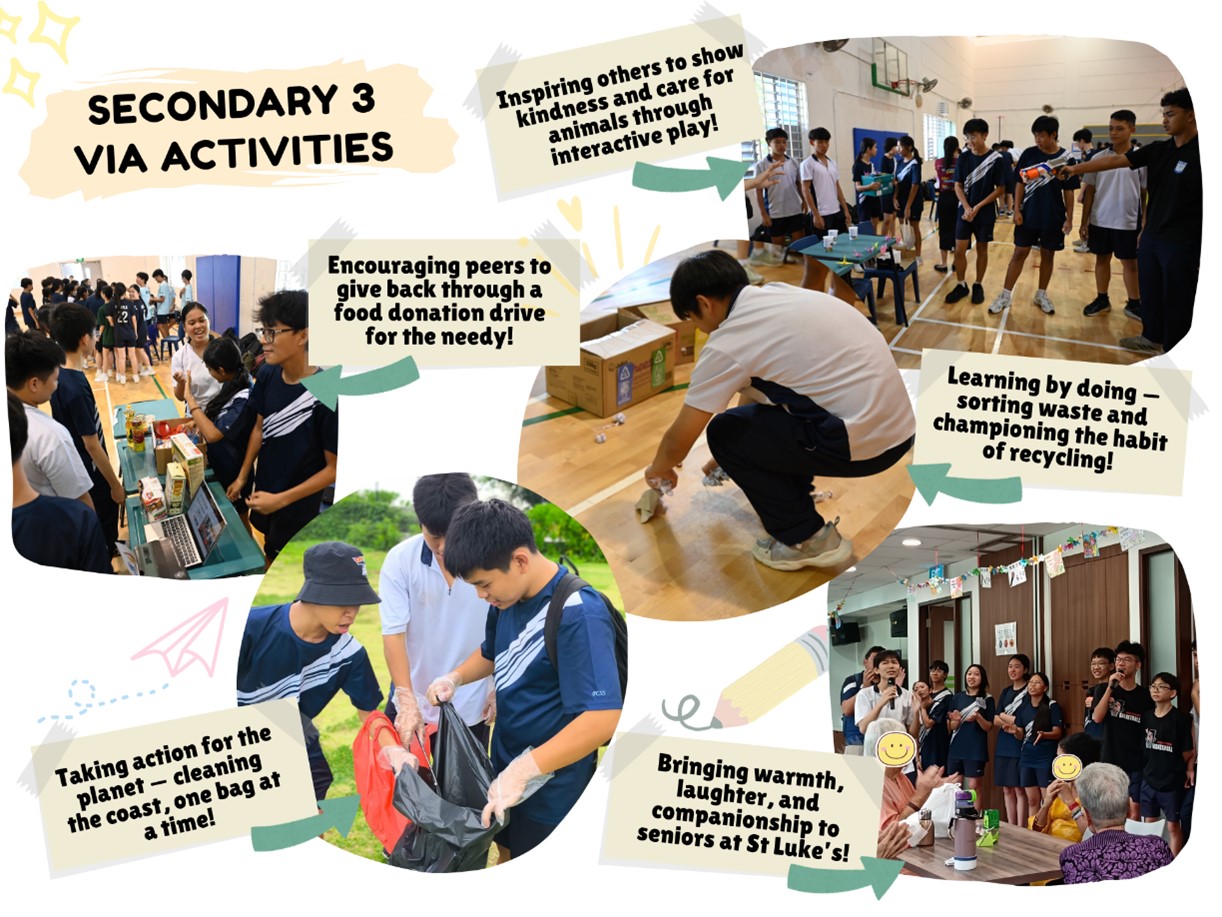
|
|---|
|
In 2025, our Secondary 3 students took their advocacy beyond the classroom by collaborating with external organisations and taking tangible action to support their causes. One class partnered with Food from the Heart, organising a school-wide food donation drive to encourage the Peicai community to support families in need. Others rolled up their sleeves to clean up the beach, contributing to environmental protection efforts. Several classes also partnered with organisations such as the SPCA and St Luke’s ElderCare, where students engaged meaningfully with animals and the elderly through hands-on service and heartfelt interaction. These experiences allowed our Secondary 3 students to transform their learning into purposeful advocacy — demonstrating compassion, responsibility, and initiative as they inspired others to care about the causes they championed. |
Overall Impact
Across all levels, students develop essential socio-emotional competencies such as empathy, resilience, and leadership. By engaging deeply with social causes and communities, they learn the importance of service and develop a strong sense of agency in making the world a better place.
Through the Values in Action programme, Peicaians grow not only as learners but as compassionate leaders and responsible citizens, equipped to make meaningful contributions to society.

